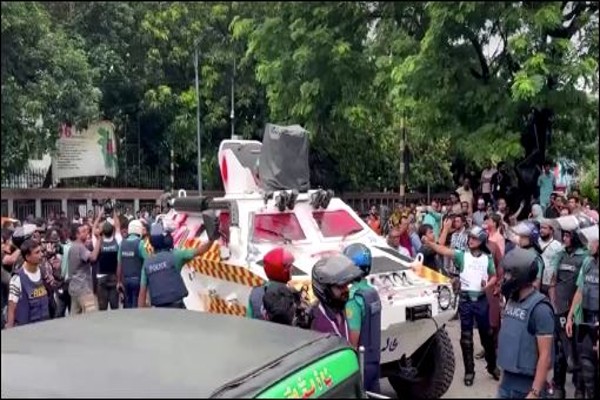DHAKA: At least 20 people were injured in clashes and police fired rubber bullets and tear gas to disperse crowds as thousands protested across Bangladesh on Friday, calling on Prime Minister Sheikh Hasina to resign.
As the student protest in Bangladesh continues into its third week, police in the Sylhet district were seen shooting at protesters earlier today. Reports of fresh clashes between students and security forces are emerging from most major cities across the country. pic.twitter.com/Ip3WRRvPRb
— Sami (@ZulkarnainSaer) August 2, 2024
The protesters were demanding justice for the families of the 150 people killed in violence during protests last month over a job quota system.
Scores of youths marched in Dhaka with chants of “we want justice” and waved anti-government banners. Elsewhere in Bangladesh, buildings including a district office of the ruling Awami League party were set ablaze, a police booth was set on fire, and armoured vehicles vandalised during demonstrations.
Police said they fired rubber bullets and tear gas as crowds attacked them in northeastern town of Habibganj, and lobbed stun grenades to scatter protesters in the nearby city of Sylhet. A witness in Sylhet said about 20 people were injured.
“They set fire to the local Awami League office and several other government offices and torched motorcycles,” said Khalilur Rahman, a police official in Habiganj, adding police had fired rubber bullets and tear gas to control the situation.
The current unrest is the biggest test facing Hasina since deadly protests when she won a fourth-straight term in January elections that were boycotted by the main opposition Bangladesh Nationalist Party.
Student groups led demonstrations last month against quotas in government jobs, including a 30% reservation for families of veterans of the 1971 war of independence from Pakistan.
Those demonstrations spiralled into violence that killed at least 150 people, injured thousands and led to about 10,000 arrests. The protests paused after the Supreme Court scrapped most quotas.
Protesters out on the streets of Bangladesh again. Massive, massive turn out today. And this is one of the most beautiful photos coming out ❤️✊️ pic.twitter.com/07Rkmfw1Gc
— Tasneem Khalil (@tasneem) August 2, 2024
Students have returned to the streets of Bangladesh in sporadic protests this week, demanding justice for families of those who were killed. Critics of Hasina and human rights groups have accused her government of using excessive force to stamp out the movement, a charge both Hasina and her ministers deny.
“People make mistakes. If she (Hasina) would have apologised, everything would be back to normal. If she cannot control it, things will keep heating up,” said Syed Sadman, a student, at a protest in Dhaka.
(REUTERS)
In a career spanning three decades and counting, Ramananda (Ram to his friends) has been the foreign editor of The Telegraph, Outlook Magazine and the New Indian Express. He helped set up rediff.com’s editorial operations in San Jose and New York, helmed sify.com, and was the founder editor of India.com.
His work has featured in national and international publications like the Al Jazeera Centre for Studies, Global Times and Ashahi Shimbun. But his one constant over all these years, he says, has been the attempt to understand rising India’s place in the world.
He can rustle up a mean salad, his oil-less pepper chicken is to die for, and all it takes is some beer and rhythm and blues to rock his soul.
Talk to him about foreign and strategic affairs, media, South Asia, China, and of course India.





